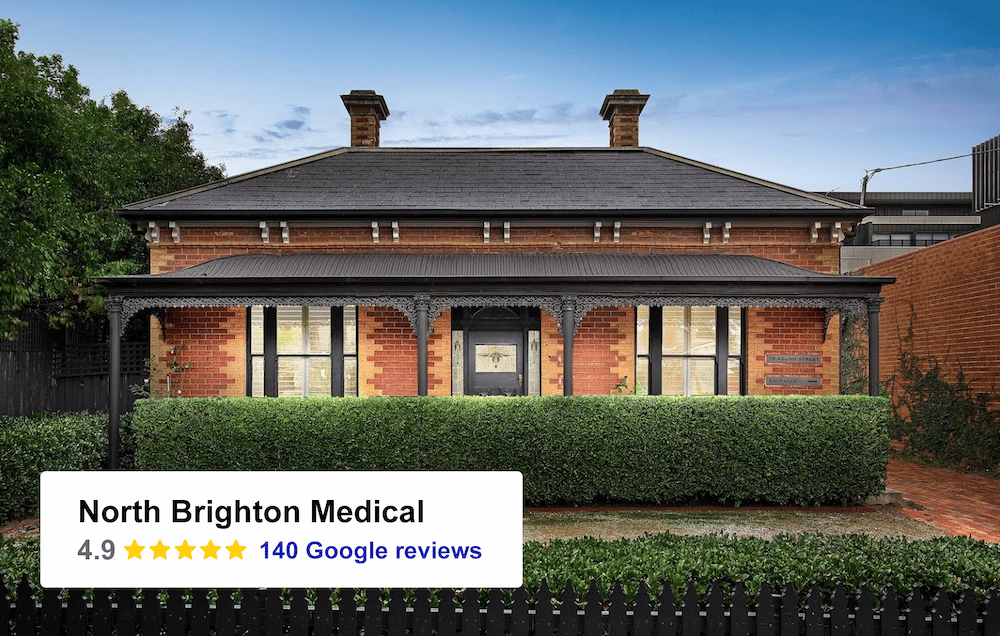What are Google reviews?
Google reviews are the comments and star reviews (out of 5) that appear publicly on Google local search* and on Google Maps. Anyone can write a review and it will show up publicly around 24 hours later. The owner of the listing can respond to reviews through their Google My Business dashboard.
*Local search are the results that show up on Google when someone is searching for a brick and mortar business like a medical practice. Google prioritises displaying businesses in the local area because people are searching for a physical place rather than an online product/service.
 What makes a high Google rating?
What makes a high Google rating?While Google is a blackbox about how they generate their ratings, we know with reasonable confidence that they value:
- High star reviews (5 stars)
- A high volume of total reviews
- Consistent reviews trickling in, rather than periodic bombardments
Why are Google Reviews important?
If there was just one piece of ‘marketing advice’ to give to any brick and mortar business (medical practices included) it would be to work hard to get as many Google reviews as possible.
Why? For two reasons:
- Google uses reviews to rank practices—the more high star reviews you have, the higher your practice will show up in local search
- Patients place recommendations from others above all else when looking for a new practice
This means if your practice can get a lot of high star reviews, you’ll not only get more eyeballs on Google because you’ll be ranked higher, but you’ll improve the chances of a patient choosing you by up to 77%.
Where did we get 77% from? Well, in a HotDoc survey of 618 Australians conducted in 2019, we found that 54% of Australian patients check a clinic’s Google reviews prior to choosing them and 77% say they are more likely to book with a clinic that has a 4+ star rating on Google.
In 18-35 year old patients, this jumped to 81% checking a practice’s Google reviews before choosing them and 92% saying they are more likely to book with a clinic that has 4+ stars. Read more stats here.
How to encourage more Google reviews
There is a lot of confusion about how practitioners can and can’t use reviews to promote their practices. The short answer is that encouraging and managing Google reviews is fine. What‘s not fine is using Google reviews to promote your practice when the review mentions clinical aspects of your services.
Our best advice is to leave Google reviews on Google (eg. don’t publish them on your website or elsewhere) and never respond to a review that mentions clinical services/processes.
So caveats aside, how do you encourage reviews?
Well, there are really only 3 ways and they all involve asking patients. It’s only the method of the ask that changes:
- In person
- Via email
- Via SMS
1. Ask in person
Have your reception team encourage patients who are checking out to leave a Google review when they get home. While this is a perfectly fine method to use, and it’s certainly better than doing nothing, keep in mind that asking in person is the least effective of the three methods.
Why? There are three reasons: (1) it places a lot of pressure on front desk staff to remember to mention it to patients at check-out, (2) it relies on the patient to remember to make a review when they get home, and (3) it relies on the patient to have the motivation to find your clinic’s listing on Google.
While all of this may sound like it shouldn’t be a big problem, every obstacle reduces the chances of a patient making a review.
2. Ask via email
At the end of each day, have your reception team email all patients that visited the practice that day with a link to your Google reviews. This is a better method than asking people in person because it (1) places less pressure on staff, and (2) the email can include a direct link to your reviews page—increasing the chances of someone actually making a review because there are less obstacles in the way.
It’s worth noting that while email is more effective than asking patients in person it is still not quite as effective as SMS. This is because only around 1 in 5 emails are opened, compared to 98% of SMS’.
3. Ask via SMS
As mentioned above, the easiest and most effective way to increase your number of reviews is to set up an automated SMS to be sent to patients post-appointment with a link to your Google reviews.
The reason why this method is better than the other two is because it (1) doesn’t require anything done by your front desk staff, (2) it can include a direct link to your reviews page, and (3) SMS has an open rate typically 5 times that of email.

HotDoc Reviews: A Case Study
HotDoc Reviews is a tool for general practices that automatically sends an SMS to patients two hours after their scheduled appointment. The SMS encourages the patient to leave a review on Google for the clinic they visited.
The team at North Brighton Medical have been using HotDoc Reviews for the past 6 months.
Practice Manager Justin Meyer says that when first introducing the idea of HotDoc Reviews to his doctors, “They were a little worried that people would use it as a way to complain about things when they were unhappy and it would lead to bad reviews.”
Although Justin says he had another view. “I saw it differently. I thought people would like our clinic because when we collected patient feedback for accreditation last year, we received very positive feedback. I had the feeling Google reviews would follow a similar path.”
When turning on HotDoc Reviews, Justin says the results were virtually instantaneous.
“We’d been open for 18 months and had 5 Google reviews. After a week of turning on HotDoc Reviews, we had another 10 reviews. A few more weeks on and we’re now at like 80+ reviews.”
As of July 2020, North Brighton Medical has 133 reviews with a star rating of 4.9 stars.
Justin says, “I think [HotDoc Reviews] has had an impact on our Google ranking because obviously Google likes seeing a lot of positive reviews. And because of that, I think it’s helping us attract more new patients.”
Pictured: (Left to right) Dr. Marcus Peplow, Nicole Franz, Justin Meyer and Dr. Ingrid Chung
“In the last week, we’ve had 191 appointments booked online. Back in August, we were getting around 25 online appointments per month. So that’s a big improvement.”
With the influx of new patients, Justin says he has been forced to turn off Google Ads, which he was previously paying for to attract new patients.
“Our books are pretty much full. We had previously been paying for Google Ads, but we’ve paused them because we don’t need them.”
“It’s been really valuable from a marketing perspective. It’s free SEO essentially. And better than the SEO you pay for, I think.”
Justin also credits HotDoc Reviews for its ease of use. “A lot of HotDoc is sort of set-and-forget—it saves a lot of work and doesn’t require a lot of work itself. HotDoc Reviews is the same.
“We switched it on and if we wanted to do nothing more at that point, we could have. But we get emails from Google notifying us of the reviews. So I always go into each of the reviews and reply, thanking them.
“You know at some point we are going to get some negative feedback, but I really don’t see it as a bad thing. We can apologise to them and try to solve the issue, but I also see it as an opportunity to learn something and improve.”

Download our FREE Guide to Google Reviews for Medical Practices
We’ll show you how to encourage more Google reviews and how to respond and manage reviews to attract more patients to your practice.



